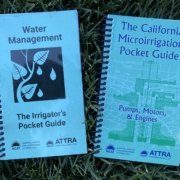Soil for Water Video Case Studies
 Print This Post
Print This Post
In this video, Eric Benfeldt, an Extension Specialist with Virginia Cooperative Extension, introduces the Soil for Water Video Case Studies series.
The purpose of this systems research project led by National Center for Appropriate Technology (NCAT) was to identify and promote practical ways of using regenerative grazing practices to improve soil health and catch and hold more rainwater in soil. Virginia Tech and Virginia Cooperative Extension’s project team conducted 11 semi-structured interviews and conversations across Virginia to learn and better understand farmers’ and ranchers’ agroecological motivations and overall values related to the protection and conservation of water resources. The project aimed to highlight distinct and diverse farms of Virginia’s agricultural community through a narrative inquiry framework.
The project team included Eric Bendfeldt, Kim Niewolny, and Katie Trozzo from Virginia Tech and Virginia Cooperative Extension; Lee Rinehart and Mike Morris of NCAT; and Ernie Didot of Clear Impact Productions.
The project team especially wants to thank the participating farmers for sharing their time, experiences, and insights about regenerative grazing and soil health-building systems with us and the broader community.
![]()
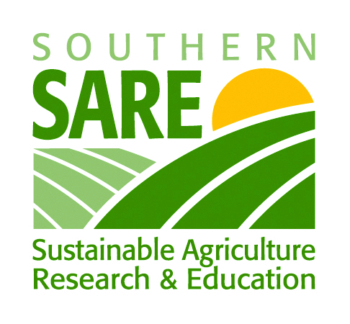 This project material is based upon work that is funded and supported by the National Institute of Food and Agriculture, U.S. Department of Agriculture, under award number 2020-38640-31521 through the Southern Sustainable Agriculture Research and Education (SSARE) program under subaward number LS21-345. USDA is an equal opportunity employer and service provider. Any opinions, findings, conclusions, or recommendations expressed in this publication are those of the author(s) and do not necessarily reflect the view of the U.S. Department of Agriculture.
This project material is based upon work that is funded and supported by the National Institute of Food and Agriculture, U.S. Department of Agriculture, under award number 2020-38640-31521 through the Southern Sustainable Agriculture Research and Education (SSARE) program under subaward number LS21-345. USDA is an equal opportunity employer and service provider. Any opinions, findings, conclusions, or recommendations expressed in this publication are those of the author(s) and do not necessarily reflect the view of the U.S. Department of Agriculture.
Virginia Cooperative Extension is a partnership of Virginia Tech, Virginia State University, the U.S. Department of Agriculture, and local governments. Its programs and employment are open to all, regardless of age, color, disability, sex (including pregnancy), gender, gender identity, gender expression, genetic information, ethnicity or national origin, political affiliation, race, religion, sexual orientation, or military status, or any other basis protected by law.
Bean Hollow Grassfed Farm
Rappahannock County, Virginia
Bean Hollow Grassfed Farm is a multi-generational farm located in the shadow of the Blue Ridge Mountains in Rappahannock County. A core belief for Michael Sands and Bean Hollow Grassfed Farm is having and encouraging a healthy ecosystem where farm and land management reinforce natural processes because a farm cannot be healthy if the land is sick. Sheep and cattle are their primary livestock, but they also have layers for eggs. Most of their meat sales are sold through their on-farm store. In this video, Michael shares about his early career as a researcher and educator with the Rodale Institute; describes how the gnawing in his gut led him into farming and the move toward more regenerative practices that strengthen biodiversity, build soil health, and sequester carbon; and explains his family’s efforts to mitigate climate change. Farming for Mike is about continuous improvement, assessment of finances and hard-to-measure ecological metrics, and making management decisions that push forward the adoption of regenerative practices, while being mindful of farm transition and conservation planning.
Bramble Hollow Farm
Bedford County, Virginia
Bramble Hollow Farm is owned and operated by Brent and Anna Wills and is located along the eastern foothills of the Blue Ridge Mountains in Bedford County. Brent and Anna and their family raise pork and chicken on pasture. They have also raised other livestock and poultry through the years. Brett and Anna use multiple market channels, including farmers markets, on-farm sales, community supported agriculture (CSA) deliveries, participation in a food hub, and affiliation with the Edible Goose Creek farm alliance. Additionally, Bramble Hollow Farm invested in an on-farm commercial kitchen to diversify and add value to what they grow and offer. In this video, Brent shares who (i.e., writings of Gene Logsdon, Wendell Berry, and others) and what influenced him and helped form his vision for regenerative agriculture where soil health equates to plant health, plant health equates to livestock health, and ultimately equates to human and planetary health.
Cattle Run Farm LLC
Greene County, Virginia
Cattle Run Farm LLC is a third-generation, family-operated, and veteran-owned farm located in Greene County and the central Piedmont region of Virginia. Sarah Morton and Ralph Morton seek to carry on the tradition of their family and expand the concept of an agrarian lifestyle and business to the community. Sarah shares about her family’s roots in farming and how asset mapping played a critical role when her father wanted to transition to the next generation. Sarah and Ralph raise cattle, chickens, produce, blackberries, hogs, cows, and more as they continue to look to add value and diversify their operation. They are active members in the Minority and Veteran Farmers of the Piedmont and work closely with several other community-focused organizations. Sarah emphasizes that Cattle Run Farm’s story is one of resilience, scale, diversification, and fortitude to keep farming and reaching towards sustainability and empowering others. Like many multi-generational family farms, sustainability, resilience, and viability are forged out of necessity. Sarah reiterates the critical importance of community in farm viability and similarly how farm viability strengthens community viability beyond the farm’s gate. Overall, the story gives a glimpse into Sarah’s and Ralph’s ecological and social consciences and how reconnecting to the land instills passion and power.
Ellett Valley Beef Company
Montgomery County, Virginia
Gil Yearwood of Ellett Valley Beef Company reflects on his time raising beef since 1975. Ellett Valley Beef Company is in Montgomery County in southwest Virginia and specializes in South Poll cattle because they are excellent for grass-based grazing systems and have relatively small frames, easy dispositions, and are tender. Gil admits he has tried every variation of rotational grazing and has found that it is significantly better than continuous grazing. Gil took an interest in cattle and grazing as a teenager. He has been a mentor for many young and second-career cattle farmers. Gil demonstrates that regenerative agriculture and grazing is a journey and an adaptive lifelong process. He openly shares his overarching goals, challenges, the lessons he has learned, and what gives him hope with soil health, water quality, and regenerative grazing adoption as he interacts with other farmers and visitors to his farm.
Ember Cattle Company
Rockbridge County, Virginia
Becky Szarzynski is the owner and operator of Ember Cattle Company in Fairfield in Rockbridge County, Virginia. Becky as a grazier has honed her grazing management skills over the past 15 years by working with her father, attending conferences, being mentored by other farmers, and serving in a coordinator role of the farmer-to-farmer mentoring network with the Virginia Forage and Grassland Council. Becky raises South Poll cattle as a cow-calf operation, breeds replacement heifers, and sells seed stock on 160 acres of land. Becky practices rotational grazing with a diverse forage base that includes native warm-season grasses, summer annuals, and cool-season perennials. She prefers the term adaptive grazing over rotational grazing because conditions are constantly changing, and you must be very observant of the interactions between soil health, plant diversity, livestock, pollinators, the weather, stocking density, and the overall system. Becky shares her motivations, lessons learned, aspirations, ongoing research and study of grazing, and, of course, her fascination with dung beetles.
Glade Road Growing
Montgomery County, Virginia
Glade Road Growing is a small family farm within the town limits of Blacksburg in Montgomery County, Virginia. Sally Walker and Jason (JP) Pall started the farm operation in 2010, building on their experience with home gardening. Sally and JP did not grow up on farms but have learned through internships, conferences, reading, YouTube videos, farm visits, and their own experiences as the farm has grown over the past 14 years. Sally and JP and their growing full-time and part-time staff raise certified naturally grown produce and pasture-raised, organic-fed pork, poultry, and eggs. They have worked with the USDA-Natural Resource Conservation Services on several cost-shared soil and water conservation practices. Glade Road Growing started marketing their produce at the Blacksburg Farmers Market, but their sales now include a farm stand and a season-long farm share and community supported agriculture (CSA) subscriptions. Nutrition, health, and connections with community are critically important to Glade Road Growing’s mission and vision. Although JP and Sally are not quick to use the term regenerative for their vegetable production practices and livestock rotations, respect for their soil, water, animals, staff, and customers is always at the forefront of their thinking, and they are growing together with the community in mind.
Heaven’s Hollow Farm
Madison County, Virginia
Heaven’s Hollow Farm is a fourth-generation family farm that has been in operation since 1951. Jacob Gilley, his wife Jennifer, and their children operate the farm in Orange, Virginia. Jacob, a first-generation farmer, is thankful for the support of his parents and credits his involvement showing cattle in 4-H as a teenager for his career in farming and conservation. He continues to learn and study through reading and visiting with other farmers. Heaven’s Hollow Farm is a commercial Black Angus cow-calf operation that also includes pastured poultry and pork. Most of their beef, poultry, pork, and eggs are marketed directly to consumers and local restaurants. Jacob and Jennifer take a holistic approach to managing their farm and seek to improve soil health, water quality, bird and wildlife habitat, and pollinator diversity as much as possible. Jacob describes their thinking about these processes and their rotations. Soil health, profitability, and quality of life must be balanced and should not be too complex. Being flexible and adaptable is important for Jacob and Jennifer, particularly with grazing, raising a family, and managing the farm holistically.
Holsinger Homeplace Farms
Rockingham County, Virginia
Holsinger Homeplace Farms is a family farm in Rockingham County in the central Shenandoah Valley. Buck and Amanda (AJ) Holsinger and their children are the tenth and eleventh generations to live on the farm. Buck and AJ started farming with the goal of feeding their family the healthiest food possible. Their animals are raised humanely and given the freedom to roam and obtain a nutritious diet from the forage base and their silvopasture system that includes black locust, black walnut, pine, cedar, and other mast, fodder, and shade-producing trees. Holsinger Homeplace Farms now provides other families excellent grassfed beef and eggs from free-range laying hens. Buck and AJ share their motivations and how they have a generational perspective. Russell Smith’s book Tree Crops was an early influence and motivation for Buck, along with his experience visiting other countries as a veteran and pilot. AJ’s background in dietetics and nutrition has influenced her perspective on soil, plant, and animal health. Silvopasture management is a centerpiece of their farm as they seek a system that is multi-functional and provides multiple benefits across time. USDA and state conservation and cost-share programs have helped them financially in getting started and allowing them to set a pathway for transforming the farm and achieving their long-term holistic vision.
Shamoka Run Farm
Augusta County, Virginia
Shamoka Run Farm is a modest family farm in northern August County, operated by Leo and Judy Tammi. Leo grew up in Delaware on a small, diversified farm with a few milk cows, hogs, sheep, and poultry. Leo and Judy moved to the Shenandoah Valley region in 1981. Leo learned very early to farm with nature and what the land is best suited to. Shamoka Run Farm is a sheep and lamb farm that includes about 240 acres of hay and pasture, along with 60 additional acres of rented land. Leo was a founder of the early Virginia Lamb Cooperative, is an active member of the Virginia Forage and Grassland Council, and has worked with the USDA Natural Resources Conservation Services and Headwaters Soil and Water Conservation District on a variety of best management practices like riparian buffers, bird and pollinator habitat, and native grass plantings. Leo shares several epiphanies and observations on rotational grazing, resiliency, aesthetics, marketing, and wildlife habitat, as well as the need to educate people about the complexity of farming and the services farming and good land productivity provides to the broader community. Leo reminds us that regenerative and soil health-building principles must be internalized, require inquisitiveness, energy, resilience, and continual observation.
Singing Spring Farm
Craig County, Virginia
Adam Taylor and Elizabeth Spellman-Taylor co-operate Singing Spring Farm, which is in the Sinking Creek Valley in Craig County, Virginia. Adam’s and Elizabeth’s goal is to be a whole, complete-diet farm that offers heirloom fruits and vegetables; goat milk, kefir, and cheese; culinary and medicinal herbs; eggs; and pastured, lamb, goat, and poultry. Agroforestry and permaculture are important themes on their farm as they seek to protect the Singing Spring on their farm, create community, and live out paradise gardening. Adam’s experience interning on a farm in southwest Virginia and being a Peace Corps volunteer in Zambia profoundly impacted how he views farming, while Elizabeth has a deep conservation ethic in agricultural land protection and agrarian commons. For each of them, Joe Hollis’s essays and musings on Paradise Gardening were instrumental for their vision of a family lifestyle that was balanced with everyday practices.
Swisher Family Farm
Rockbridge County, Virginia
Jerry Swisher is a cattleman, farm consultant, and retired Senior Extension Agent for dairy sciences. He continues to own and operate Swisher Family Farm, his family’s farm in Fairfield and Brownsburg in Rockbridge County, Virginia. Throughout his career with Virginia Tech and Virginia Cooperative Extension, Jerry served in many capacities to support Virginia’s dairy farmers, 4-H youth, and industry. Jerry designed and developed the Dairy Rotational Loafing Lot System, which became a standard best management practice for dairy farms to prevent soil erosion, protect natural resources, and enhance cow comfort and performance. Jerry was instrumental and a key resource for Virginia and Mid-Atlantic dairy farmers who desired to transition to grass-based dairy systems. He led multiple educational tours regionally and internationally so farmers could learn from other grass-based farmers in Ireland, New Zealand, and Australia. He provides an historical perspective and motivated farmers to transition to grazing systems rather than conventional confinement with limited access to pastures. Jerry documents farmers’ motivations for grazing in an era of high costs and frantic industrial change, the pushback from the dairy industry, and frequently asked questions about grass-based regenerative dairy farming.

 Canva Pro
Canva Pro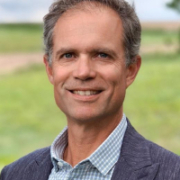
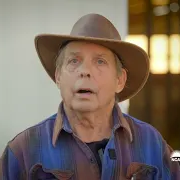
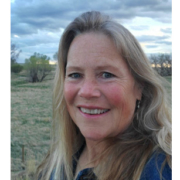
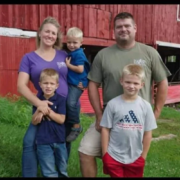
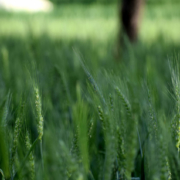
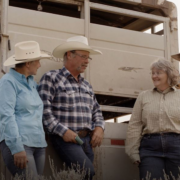
![ogalalla]2](https://attra.ncat.org/wp-content/uploads/2021/05/ogalalla2-180x180.jpg)
